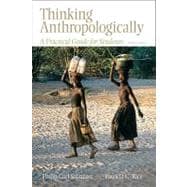
Note: Supplemental materials are not guaranteed with Rental or Used book purchases.
Purchase Benefits
What is included with this book?
In This Section:
I. Author Bio
II. Author Letter
I. Author Bio
Phillip Carl Salzman is a professor at the McGill University Department of Anthropology. He received his Ph.D. from the University of Chicago in 1972. He has conducted ethnographic research primarily among nomadic and pastoral peoples, in Baluchistan (Iran), Rajasthan (India), and most recently in Sardinia (Italy).
Patricia C. Rice is professor emeritus at the West Virginia University Division of Sociology and Anthropology. Her other publications include Biological Anthropology and Prehistory: Exploring Our Human Ancestry.
II. Author Letter
Dear Colleague,
Thinking Anthropologically: A Practical Guide for Students opens to students a foundational understanding of major topics in anthropology through presentation of those topics in short, original chapters with examples. Most students in basic anthropology classes come into the class without really knowing what anthropology is all about, or they may think they do, but are incorrect. When students begin to think like anthropologists early on they will not only enjoy the class more, they will do better work.
Teachers of anthropology may find TA useful in providing this kind of background coverage, thus allowing alternative focus in lectures and other readings. For example, Thinking Anthropologically might be assigned in conjunction with several ethnographies in a cultural anthropology class. It may also be used as a digestible preface and overview for a large, general textbook in a four-field introductory class.
The First Edition of TA covered the following major topics to help students begin to think anthropologically: patterns, holism, theory, science, change, disagreement among experts, ethics, and applications. In subsequent editions, we have added, partly following the suggestions of teachers who have used earlier editions, a set of new chapters to cover topics that provide further basic understanding for students, as well as those of great current interest.
The Second Edition added two new original chapters, which also appear in the Third Edition:
· "Making Ideas Researchable," Philip Carl Salzman (McGill University) and Patricia C. Rice (West Virginia University)
· "Thinking Anthropologically About ‘Race’: Human Variation, Cultural Construction, and Dispelling Myths, " Yolanda T. Moses (University of California, Riverside)
There are also two new original chapters in the Third Edition:
· "Thinking With Gender," Paloma Gay y Blasco (University of St. Andrews, Scotland)
· "Fieldwork: Collecting Information," Philip Carl Salzman (McGill University, Canada), Barbara J. King (College of William and Mary), Norah Moloney (Institute of Archaeology, University College London), and Norma Mendoza-Denton (University of Arizona)
All of the articles in the First and Second editions have been revised for the Third Edition in the light of suggestions by instructors. We would welcome comments and suggestions by colleagues, in the hope of improving future editions. How would Thinking Anthropologically serve you and your students better? Please feel free to contact us at philip.salzman@mcgill.ca and pat.rice@mail.wvu.edu.
Sincerely yours,
Philip Carl Salzman and Patricia C. Rice
McGill University and West Virginia University
| Introduction to Thinking Anthropologically | p. 1 |
| What Anthropologists Look For: Patterns | p. 6 |
| Thinking Holistically | p. 15 |
| Thinking Theoretically | p. 26 |
| Using Science to Think Anthropologically | p. 36 |
| Thinking About Change: Biological Evolution, Culture Change, and the Importance of Scale | p. 45 |
| Why Do Anthropological Experts Disagree? | p. 55 |
| Thinking and Acting Ethically in Anthropology | p. 68 |
| Applying Anthropological Knowledge | p. 76 |
| Making Ideas Researchable | p. 85 |
| Thinking Anthropologically About ôRaceö: Human Variation, Cultural Construction, and Dispelling Myths | p. 94 |
| Thinking with Gender | p. 106 |
| Fieldwork: Collecting Information | p. 116 |
| How to Take Anthropology Tests | p. 128 |
| Glossary | p. 135 |
| Name Index | p. 141 |
| Subject Index | p. 143 |
| Table of Contents provided by Ingram. All Rights Reserved. |
The New copy of this book will include any supplemental materials advertised. Please check the title of the book to determine if it should include any access cards, study guides, lab manuals, CDs, etc.
The Used, Rental and eBook copies of this book are not guaranteed to include any supplemental materials. Typically, only the book itself is included. This is true even if the title states it includes any access cards, study guides, lab manuals, CDs, etc.